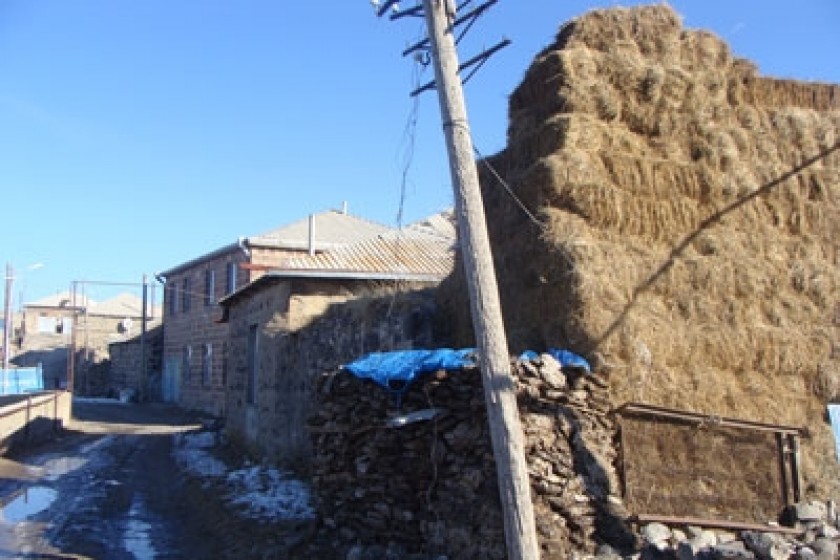
Verin Getashen: Village Women Now Voice Their Concerns Re: Male/Female Divide
A crowd had gathered in the mayor’s office of the Gegharkouniq village of Verin Getashen.
When they found out that I was a reporter, one resident exclaimed, “Write about the potatoes. We grow them but can’t sell them. We’re living on potatoes and animal raising her. Today, they banned meat, tomorrow potatoes…”
It’s true. The village lives on the growing of potatoes and farming in general. Residents say that in recent years, say residents, potato farming has become less and less profitable. They point to big business as the culprit.
Residents told me that in the past they would grow their crops and sell the produce here and there. Now, with the advent of large-scale farming, with MPs and other officials owning thousands of acres of land, the little guys are being squeezed out of the market.
Village financial advisor Mourad Mouradyan argues that there is no local planning. It’s everyone for themselves. Villagers grow potatoes and then sell them to resellers at 50-60 AMD per kilo. The resellers turn around and sell the crop to end-line consumers for 150.
Mouradyan says the lot of villagers is getting increasingly hard and that hunger stalks Armenia’s rural communities.
“My poor daughter-in-law had to grow potatoes while she was pregnant, just to have a bit of money. Today, the crop isn’t being sold. The common people are to be pitied.”
Village residents complain that the Ministry of Agriculture implements projects to improve the crop but has nothing to offer in terms of selling it.
When I tell Mourad that I came across some nice houses in the village, the financial advisor argues that it’s because so many young people have left for seasonal work in Russia. When they return to Verin Getashen they use the money to renovate.
Mourad’s sons also travel every year to Russia for work, mainly in construction.
Another resident, who wished to remain anonymous, told me that he liked President Sargsyan’s foreign policy because it fostered good ties with Russia. Sargsyan’s domestic policy, according to the villager, was non-existent.
“If it wasn’t for the Russians, we’d starve. We are big backers of Putin and Medvedev. Those who feed and keep us, they are our presidents,” he said.
The official population of the village is 5,026 but Municipal Chief of Staff Martin Mkhitaryan says the real figure is more like 4,000. Local residents confess that less than that actually live in the village.
Mouradyan told me that 1,400 left for seasonal work in 2011 and the figure rose to 1,800 this year. He said that some find work abroad and then come back to take their families as well.
You won’t see many men in the village during the summer – it’s mostly women, children and the elderly.
“Young men get married and bring their wives home for their parents to take care of. The new husbands leave a month or so after getting married. They’ll come home once a year for the holidays and then they’ll go back,” explained Mouradyan.
One woman I met, I’ll call her Aleta, said her husband had been away for years working abroad. She cannot leave and visit him since she has the responsibility of taking care of his parents.
Aleta says she has no complaints – her husband respects her, listens to her opinions, and she can even leave the house on her own and buy the clothes she wants. That’s a big luxury for some village women.
Astghik is the 19 year-old daughter of Seda. Like most of the young girls in the village she doesn’t work and didn’t continue her education after finishing high school. She spends her time watching TV serials in the village cultural center.
The day I visited the village, there was a wedding. Astghik could only leave the house with her father’s permission.
I was told that artificial abortions are common place in the village, frequently performed at home.
“I’ve had six abortions. Once I drank some medicine and had complications. My life was barely saved. I had to have the abortion. They raised a ruckus because I wasn’t giving birth to a son,” says Ankin.
Seda complains that women work like men but that they get no respect.
It’s not right. We work just like them. When they return, we get all the blame because certain things in the home aren’t to their liking.”
Village women told me that in years past, they couldn’t even think about such issues, let alone express them as they do today.
“This morning my husband and I went to the cattle shed to look after the animals. When we returned home, he told e to fix him breakfast. It only took me ten minutes to change and cook him something. He got angry and left without eating. But we both work. He has feet and hands. Why can’t he fix a meal once and awhile?” recounts Asya.
As we were conversing, her husband Viken enters the house. He hears what Asya is saying and hits the roof. We quickly change the topic of conversation to the weather. (I dare not tell him that I am a reporter, just a friend of so and so)
Viken sits by the stove and all at once remembers the incident of the late breakfast. He picks up a file by the stove and throws it at his wife, hitting her in the eye.
P.S. For a long time after witnessing this, I couldn’t write a thing. But as I left the village Asya told me, “Write what you saw. Let them understand that one day women will say enough is enough. I might not see that day, but it will surely come.”
(The names of local residents have been changed for obvious reasons)
 Videos
Videos Photos
Photos
Comments (5)
Write a comment